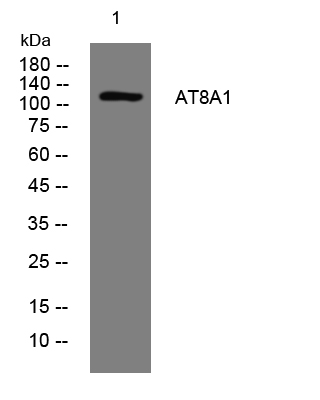AT8A1 Rabbit Polyclonal Antibody
AT8A1 Rabbit Polyclonal Antibody
- 产品详情
- 实验流程
- 背景知识
Application
| WB |
|---|---|
| Primary Accession | Q9Y2Q0 |
| Reactivity | Human, Mouse |
| Host | Polyclonal, Rabbit,IgG |
| Clonality | Polyclonal |
| Calculated MW | 131369 Da |
| Gene ID | 10396 |
|---|---|
| Other Names | Phospholipid-transporting ATPase IA, 7.6.2.1, ATPase class I type 8A member 1, Chromaffin granule ATPase II, P4-ATPase flippase complex alpha subunit ATP8A1, ATP8A1 (HGNC:13531), ATPIA |
| Dilution | WB~~1:1000 |
| Storage Conditions | -20℃ |
| Name | ATP8A1 (HGNC:13531) |
|---|---|
| Synonyms | ATPIA |
| Function | Catalytic component of a P4-ATPase flippase complex which catalyzes the hydrolysis of ATP coupled to the transport of aminophospholipids from the outer to the inner leaflet of various membranes and ensures the maintenance of asymmetric distribution of phospholipids (PubMed:31416931). Phospholipid translocation also seems to be implicated in vesicle formation and in uptake of lipid signaling molecules. In vitro, its ATPase activity is selectively and stereospecifically stimulated by phosphatidylserine (PS) (PubMed:31416931). The flippase complex ATP8A1:TMEM30A seems to play a role in regulation of cell migration probably involving flippase- mediated translocation of phosphatidylethanolamine (PE) at the cell membrane (By similarity). Acts as aminophospholipid translocase at the cell membrane in neuronal cells (By similarity). |
| Cellular Location | Cytoplasmic vesicle, secretory vesicle, chromaffin granule membrane {ECO:0000250|UniProtKB:P70704}; Multi-pass membrane protein {ECO:0000250|UniProtKB:P70704}. Cytoplasmic granule. Cell membrane. Endoplasmic reticulum Golgi apparatus. Note=Exit from the endoplasmic reticulum requires the presence of TMEM30A, but not TMEM30B (PubMed:20947505). In the presence of TMEM30A, predominantly located in cytoplasmic punctate structures and localizes to the cell membrane (PubMed:20947505) Localizes to plasma membranes of red blood cells (By similarity) {ECO:0000250|UniProtKB:P70704, ECO:0000269|PubMed:20947505} |
| Tissue Location | Found in most adult tissues except liver, testis and placenta. Most abundant in heart, brain and skeletal muscle. Also detected in fetal tissues. Isoform 1 is only detected in brain, skeletal muscle and heart and is the most abundant form in skeletal muscle. Highly expressed in platelets (PubMed:30674456) |
For Research Use Only. Not For Use In Diagnostic Procedures.
Provided below are standard protocols that you may find useful for product applications.
BACKGROUND
The P-type adenosinetriphosphatases (P-type ATPases) are a family of proteins which use the free energy of ATP hydrolysis to drive uphill transport of ions across membranes. Several subfamilies of P-type ATPases have been identified. One subfamily catalyzes transport of heavy metal ions. Another subfamily transports non-heavy metal ions (NMHI). The protein encoded by this gene is a member of the third subfamily of P-type ATPases and acts to transport amphipaths, such as phosphatidylserine. Two transcript variants encoding different isoforms have been found for this gene. [provided by RefSeq, Jul 2008],
终于等到您。ABCEPTA(百远生物)抗体产品。
点击下方“我要评价 ”按钮提交您的反馈信息,您的反馈和评价是我们最宝贵的财富之一,
我们将在1-3个工作日内处理您的反馈信息。
如有疑问,联系:0512-88856768 tech-china@abcepta.com.























 癌症的基本特征包括细胞增殖、血管生成、迁移、凋亡逃避机制和细胞永生等。找到癌症发生过程中这些通路的关键标记物和对应的抗体用于检测至关重要。
癌症的基本特征包括细胞增殖、血管生成、迁移、凋亡逃避机制和细胞永生等。找到癌症发生过程中这些通路的关键标记物和对应的抗体用于检测至关重要。 为您推荐一个泛素化位点预测神器——泛素化分析工具,可以为您的蛋白的泛素化位点作出预测和评分。
为您推荐一个泛素化位点预测神器——泛素化分析工具,可以为您的蛋白的泛素化位点作出预测和评分。 细胞自噬受体图形绘图工具为你的蛋白的细胞受体结合位点作出预测和评分,识别结合到自噬通路中的蛋白是非常重要的,便于让我们理解自噬在正常生理、病理过程中的作用,如发育、细胞分化、神经退化性疾病、压力条件下、感染和癌症。
细胞自噬受体图形绘图工具为你的蛋白的细胞受体结合位点作出预测和评分,识别结合到自噬通路中的蛋白是非常重要的,便于让我们理解自噬在正常生理、病理过程中的作用,如发育、细胞分化、神经退化性疾病、压力条件下、感染和癌症。






